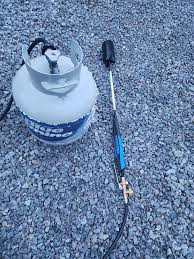FacEngrPE said:
The other approach is Natural Gas + ignition by diesel pilot fuel injection.
I first encountered a red-neck version of this in Northern Canada in the mid 80's.
In the winter's truckers had an issue going from a high humidity area to a lower temperature area.
Moisture in the brake-lines would condense and then freeze.
This tended to happen in control valves when releasing air.
The condensate would freeze and stick the valves.
This often led to the brakes being applied.
Northern truckers often carried a "Tiger-Torch" to enable them to thaw frozen brake valves.
An old trucker's trick was to carry the propane tank in the cab.
The torch would be taken off of the hose and the hose passed out the passenger side window and stuck into the air cleaner.
When the driver wanted to pass a more powerful truck on an up-grade, he would reach over and crack the propane valve open.
The addition of propane to the intake air often allowed an engine to develop more HP than a nominally more powerful engine.
And about the same time I heard of an LNG experiment.
A trucking company had a regular freight haul between two cities about 150 miles apart.
They outfitted some trucks with insulated LNG tanks and ran the route using mostly LNG for energy.
Just enough diesel fuel was used to ignite the gas.
The tanks were insulated but not refrigerated.
Vaporizing the gas for use kept the liquid cool and the vapour pressure down.
It was a use it or lose it system.
With a suitable diesel engine, the diesel fuel governor would be set at idle.
The speed and energy output would be controlled by the amount of gas vapour added to the intake, by a governor controlled control valve.
On the failure of the gas vapour supply, the diesel fuel governor would be set to working speed.
I apologize for providing anecdotes rather than hard information and links.
However, you may find it rewarding to pursue and research this approach.
I do hope that your intended gas supply is not sour gas.
The engine will not last very long burning sour gas.
--------------------
Ohm's law
Not just a good idea;
It's the LAW!

